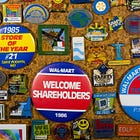My attempt to compress everything noteworthy I read, watched, listened to, and discovered during the past week.
Book Notes - Amp It Up by Frank Slootman
My first official Book Notes post. This is the first of over 100 books I will be adding to the site. This will be a long-term project working to burn down the backlog of previously read books from the past decade, plus anything new I’m reading.
Founders Pod #8 - The Intel Trinity
I had zero prior knowledge of the inner working of the microprocessor industry so this was new and interesting in that regard. I didn’t take many notes but the story is a wild one. I’m surprised this hasn’t been made into a movie already.
Insight from Senra after discussing how Intel learned from their mistakes and brought the company back from the brink on multiple occasions:
“The reason we read books, the reason we listen to podcasts is because we're obsessed with learning and I think if you have one meta-skill in life in addition to building good habits it’s learning to learn and solve problems.”
Viewing learning as a meta-skill changed the entire trajectory of my life. I don’t think I can overstate how powerful and important this concept is. Having the belief in yourself that you are able to learn to learn (hence the meta) anything you so choose is the ultimate superpower.
Founders Pod #7 - Grinding it Out: The Making of McDonald’s
This is the book the movie Founder was based on, so I had some familiarity with the story. However, Senra mentions the book was far superior. I enjoyed the movie and even though I haven’t eaten at a McDonalds for close to a decade I have a nostalgic love for the brand and its place in American business history. Definitely adding to the reading list.
Three things I’m stealing:
The simplicity of the procedure allowed the McDonald's to concentrate on quality in every step and that was the trick.
Unattributed quote: “Make every detail perfect and limit the number of details to perfect.”
Kroc - “I work from the part to the whole, and I don't move on to the large-scale ideas until I've perfected the small details.”
Founders Pod #6 - Sam Walton: Made in America
Generally speaking, I avoid going to Walmart, but I loved this episode. I was pleasantly surprised by the wisdom and eccentricity of Sam Walton and will definitely be picking up a copy of the book. Now that I have more background and perspective on what they are aiming to achieve with their stores the Walmart experience makes a whole lot more sense. I took a bunch of notes on this one and you can find them in the post linked below.
Three things I’m stealing:
Walton — “I think more than anything, it proves there's absolutely no limit to what plain, ordinary working people can accomplish if they've given the opportunity and the encouragement and the incentive to do their best. So maybe by telling it the way it really happened, we can help some other folks down the line take these same principles and apply to their dreams and make them come true.”
The more you share profits with your associates, whether it's in salaries or incentives or bonuses or stock discounts, the more profit will accrue to the company.
Anecdote about Walton that underscores the importance of collecting and sharing information - Personally, he's such a fine, unassuming, quiet gentleman. But he's always picking your brain and he'll always have a notebook or tape recorder. Here learn everything you know, but he shares his information freely with you in return.
I aspire to be a modern-day version of this.
Huberman Lab Pod - Science-Based Mental Training & Visualization for Improved Learning
During the seasons of life, I spent playing baseball and golf competitively I found visualization to be highly beneficial, so I was excited to hear what Huberman had compiled on the subject. Truthfully, I wouldn't recommend listening to this one, it’s dense and meandering and can really be summed up in a few bullets.
Principle #1: Very Brief, Simple, Repeated Visualization
Yes, and I’ve also found it beneficial to do longer simulations combining real-life movements and visualization. For example, my favorite way to practice golf on the driving range is to visualize the hole or course I’m playing in vivid detail.
Principle #2: Mental Training Cannot Replace Real Training
The takeaway here is that you have to be able to execute the movement in real life before visualization can provide benefits.
Principle #3: Combining Real & Mental Training
Playing a few holes like this on the driving range is one of the most effective forms of practice I’ve discovered.
Principle #4: Assigning Real-World Labels to Visualizations
In golf, we have positions 1-6, commonly referred to as “P1, P2, P3” etc.. Breaking down the swing into distinct parts with labels is highly valuable when practicing in the real world and during mental training
Principle #5: Mental Imagery Equivalence to Real-World Perception
Stop-Signal Task, Withholding Action
I found this interesting for a couple of reasons. First, sticking with the golf theme most bad shots are due to some extraneous movement rearing its ugly head. Second, this because provided a new perspective for me to view the development of the twins. Watching them attempt to use utensils is a perfect example of a skill requiring them to withhold action. I’m looking forward to them becoming less irratic with a spoon by developing their ability to withhold extraneous motor movements.



